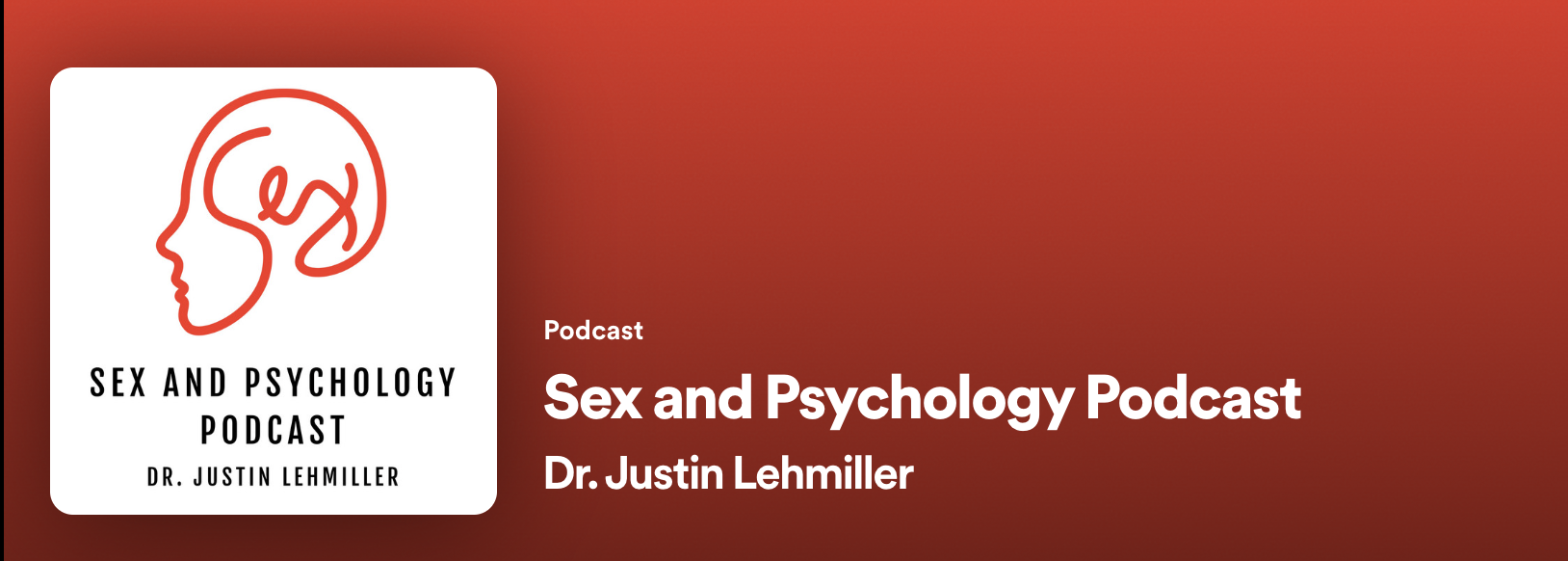How To Use the Sex and Psychology Podcast in Your Classroom
June 26, 2023 by Emily Mendelson
We’re excited to announce that the third edition of Dr. Lehmiller’s The Psychology of Human Sexuality textbook is now available for pre-order! The updated text will arrive in fall 2023, giving instructors who teach courses in psychology, human sexuality, and public health — just to name a few examples — time to implement the updated materials in 2024.
We will post updates on some of the major changes to the book and supplemental materials soon, but in the meantime, one of the new features we’re most excited for is a companion podcast guide. Our colleague Dr. Steven Rouse has generously compiled a comprehensive resource that uses episodes from the Sex and Psychology podcast in conjunction with each chapter. This guide outlines the focus of each podcast and offers a series of in-depth discussion questions that are relevant to both the episode and chapter. You can access this resource in its entirety here. Below, we’ll outline these suggestions to give you a sneak peek!
Please note that each podcast episode is hyperlinked so that you can easily access the resources from this blog post. For a comprehensive list of episodes, you can find them on the Sex and Psychology website, or on Spotify, Google Podcasts, Apple Podcasts, and Amazon Music.
Chapter 1: Theoretical Perspectives on Human Sexuality
Chapter 1 reviews major perspectives on human sexuality and the biopsychosocial influences that drive us to have sex. We recommend students listen to Episode 107 with Dr. Nicole McNichols as a way to discuss various theoretical perspectives on attachment styles as one pertinent (and relatable) example of a powerful force on human sexual behavior.
Chapter 2: Sexology Research: History, Methods, and Ethics
Chapter 2 is all about sex science, including its history, famous experiments, ethical considerations, as well as how to evaluate sexology research. You can use Episode 53 with Dr. Lisa Dawn Hamilton to help dispel myths students may subscribe to surrounding sex. You may also consider Episode 180 with Dr. Amy Moors, who speaks about her experience researching consensual non-monogamy.
Chapter 3: Human Sexual Anatomy
Chapter 3 provides an overview about the internal and external anatomy of the penis and vulva, as well as genital health issues that may arise. Students can listen to Episode 81 with Dr. Jennifer Lincoln, who explains vaginal health to listeners and addresses questions about public hair grooming and low sexual desire, among many other things. You may also consider Episode 120 with Dr. Amy Pearlman, who educates listeners about erectile dysfunction and how to monitor erectile health.
Chapter 4: Human Sexual Response: Understanding Arousal and Orgasm
Chapter 4 is all about the factors that influence sexual arousal. We recommend assigning Episode 48 with Dr. Emily Nagoski to give students the chance to learn about arousal non-concordance (i.e., why physical and psychological arousal don’t always line up), desire discrepancies, and navigating body image. You may also consider comparing the discussion of genital orgasms in Episode 149 with Dr. Laurie Mintz with the discussion of non-genital orgasms in Episode 135 with Dr. Barry Komisaruk.
Chapter 5: Gender and Gender Identity
Chapter 5 discusses biological and psychosocial influences on gender and sexuality, variations in gender expression, and sex differences in psychology. In Episode 122 with Dr. Paul Vasey, we learn about his research on fa’afafine, a third gender in Samoan culture. This episode gives students the opportunity to connect back to lessons in earlier chapters in the context of the social construction of the LGBTQ+ community.
Chapter 6: Sexual Orientation
Chapter 6 reviews theories of sexual orientation, attitudes towards LGBTQ+ persons, and measurement of sexual orientation in research. We recommend Episode 57 with Dr. Lisa Diamond, which is all about sexual and gender fluidity. Additionally, Episode 189 with Dr. Malvina Skorska is a great way for students to learn about researching asexuality.
Chapter 7: The Laws of Attraction
Chapter 7 asks what attracts us to other people and reviews individual differences we may have within the attraction process. Episode 132 with Dr. Alison Ash is a fun episode to have students listen to. Dr. Aly explains the differences between in-person and online flirting, ethical flirting, and how to handle rejection.
Chapter 8: Intimate Relationships: Sex, Love, and Commitment
Chapter 8 is all about intimate relationships, including committed relationships, casual relationships, singlehood, and the secrets to relationship success. Students can listen to Episode 41, in which Dr. Gary Lewandowski discusses the science-backed secrets to relationship success. You may also consider Episode 138 with Jessica Fern, who discusses navigating attachment with multiple partners. Students can also learn all about why being single can be awesome with Dr. Yuthika Girme in Episode 174.
Chapter 9: Sexual Behaviors
Chapter 9 discusses both individual and partnered sexual behaviors, and provides information about the benefits of sex and orgasm. In Episode 105, Dr. Nicole McNichols discusses the rise of kink among college students, as well as how the #MeToo movement frames the way young people explore their sexuality. For this chapter, you can also ask students to listen to Episode 147, which includes a collection of experts talking about the benefits of masturbation.
Chapter 10: Lifespan Sexual Development
Chapter 10 explains how sexual development occurs from infancy through adolescence, in addition to considering the biopsychosocial influences on the sexual activities of older adults. Episode 86 with Joan Price helps dispel myths about sexuality among seniors, which may be especially important for learners who are primarily emerging adults. You may also want students to listen to Episode 193 with Dr. Michele Meek, who discusses the rise in sexting among teens.
Chapter 11: Sex Education, Contraception, and Pregnancy
Chapter 11 reviews sex education, contraception, and pregnancy. We recommend that students listen to Episode 46 with Dr. Kristen Mark, who discusses the importance of pleasure within sex education. Additionally, Dr. Sarah Hill discusses the effects of birth control on the brain in Episode 144, and Dr. Natalie Rosen discusses how to navigate sex during pregnancy and parenthood in Episode 88.
Chapter 12: Sexually Transmitted Infections and Safer Sex Practices
Chapter 12 explains factors that increase the spread of STIs, the psychological impact of STIs, as well as the differences between bacterial and viral infections. Episode 39 with Dr. Ina Park provides students with a great explanation about the necessity to normalize and destigmatize having an STI.
Chapter 13: Sexual Dysfunction and Sex Therapy
Chapter 13 provides information about the causes of sex difficulties, types of sexual dysfunction, as well as some specific treatments that are provided during sex therapy. In Episode 83, Dr. Jennifer Gunsaullus discusses ways to combat sexual insecurity, and provides information on how to resolve a variety of sexual concerns students may have. Episode 145 with Dr. Laurie Mintz also provides advice on how to solve sexual problems without sex therapy.
Chapter 14: Variations in Sexual Behavior
Chapter 14 discusses different patterns of sexual attraction, as well as sexual behaviors that deviate from social and cultural norms. In Episode 44, Dr. Richard Sprott clarifies the distinctions between kink, BDSM, and fetishes. You may also consider Episode 137 with Stefani Goerlich, who demystifies kink and BDSM for those who are unfamiliar.
Chapter 15: Sex Laws, Sexual Victimization, and the Sexual Marketplace
Chapter 15 outlines the history of sex laws and provides information about sex work, sex trafficking, and pornography. In Episode 72, Stavroula Toska speaks about her experiences as a professional dominatrix. For a discussion on sex crimes, we recommend listening to Episode 129 with Dr. Lucy Neville and Episode 176 with Dr. Michael Seto.
Thank you again to Dr. Steven Rouse for developing a fantastic teaching resource using episodes from the podcast. We hope you have a great time listening and learning in your classrooms!
Will you be using the podcast as a resource in your classes? Have an idea for an episode? Let us know in the comments below.
Want to learn more about Sex and Psychology? Click here for more from the blog or here to listen to the podcast.
Image Source: Sex and Psychology

Dr. Justin Lehmiller
Founder & Owner of Sex and PsychologyDr. Justin Lehmiller is a social psychologist and Research Fellow at The Kinsey Institute. He runs the Sex and Psychology blog and podcast and is author of the popular book Tell Me What You Want. Dr. Lehmiller is an award-winning educator, and a prolific researcher who has published more than 50 academic works.
Read full bio >


